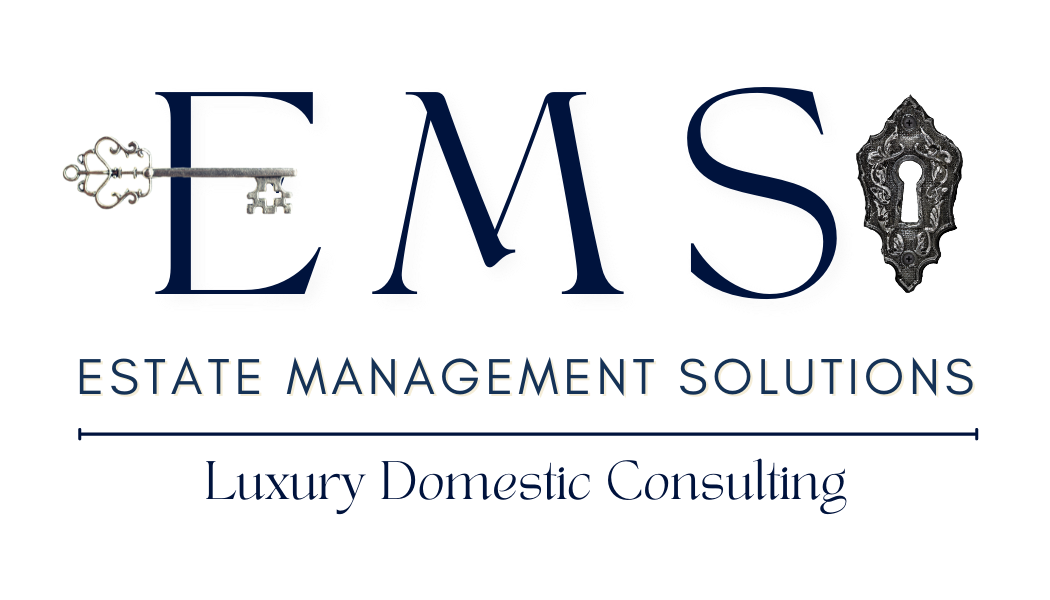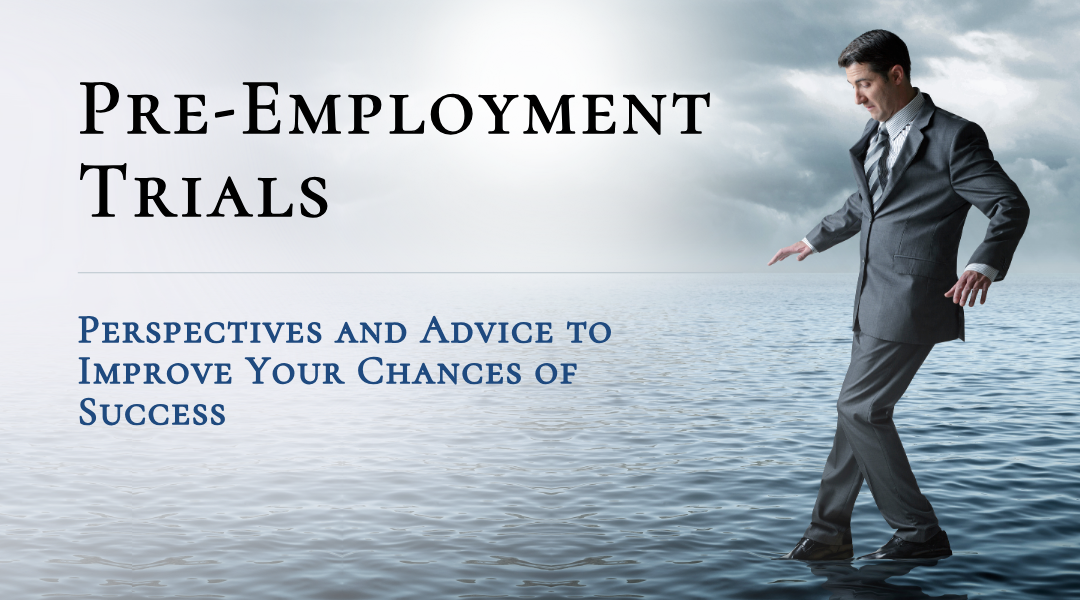Starting a new job is exciting, but it can also be nerve-wracking. This blog expounds on how the different parties involved see pre-employment trials and how to navigate them toward success.
Let’s imagine that you’re at the stage wherein the perseverance and hard work that you’ve put into the job search is finally coming to fruition, and you are going in for a trial to determine if this is the perfect position for you. It’s a mixture of nerves, adrenaline, and high hopes; it can be an exhilarating experience. The trick is to channel this energy correctly, especially during pre-employment trials, so that it doesn’t impact the energy of the home. Nervous energy can give the Principal the wrong impression about you but it can also cause you to miss the potential red flags, regardless of how great the offer is. I speak from experience on this one! It’s amazing how easy it is to explain something away when your mind is clouded by anticipation, excitement, and fear of not getting the job.
Let’s dive into the topic of pre-employment trials and understand how stakeholders – Principals, Candidates, and Agencies – perceive them and what some of the best practices should be when approaching one.
Trial Length:
Our experience has led us to believe that trials should be 3 – 5 days in length. Some trials can go as long as two weeks, but by the end of the first week, most employers already know what direction they want to go. Anything longer than two weeks is more of a temporary employment situation.
NOTE: This is NOT the 90-day probationary period. This is the trial period prior to being presented with a formal offer. They are two completely different topics.
Core Purpose:
For The Principal: To observe you in their environment. Do you integrate well into their home and household culture? Occasionally, they may have you perform a skills test such as drafting a mock travel itinerary, making the bed, or packing a travel suitcase.
For The Professional: To give you the opportunity to see the environment and how it operates. Is this an environment that you can see yourself in for years to come? Is this the job you want? Is the job description accurate? Is the payscale accurate? If traveling, is this the area you want to live in, and can you see yourself creating a home here?
For The Agency: Agencies aim for mutual satisfaction and successful job placements. The purpose of pre-employment trials is to gauge and provide valuable insights to both the Principal and the Professional. Getting additional insights into the position from the candidate’s feedback is something in which the agency should be thankful, as long as it’s presented in a positive manner and is constructive. A clearer picture of the positions gives them the data they need to negotiate the right package for the position.
NOTE: Remember two things when discussing details and reviewing the trial with your agency:
- The agency is contractually bound to the Principal; we are merely relaying what they communicated to us to the extent allowed by our contractual obligations.
 Don’t shoot the messenger!
Don’t shoot the messenger! - There are three sides or truths to every story: yours, theirs, and the reality.
Principals: Finding the Right Fit
Principals want to find candidates who fit well in their personal homes. Their main concern is: “Is this the right person for our home?” They are evaluating how you interact with them, the family, and the other staff. There are positions and trials that will ask you to demonstrate technical skills, such as creating an itinerary for travel, preparing and serving a meal, or how well you make their bed. However, there is no (or at least their shouldn’t be any) expectation of change. They are simply evaluating if the person would be the right fit for the position to ensure that the transition will be seamless and that they can envision you there for years to come. Yes, it’s really that simple. Will they be evaluating your skills? Yes, but we see more candidates eliminated due to poor fit rather than poor skills. Quite often, we hear from Principals: “They were really great, but they didn’t seem to fit in.” Or, the other way around: “They did a decent job, not great, but they seemed to fit right in with the team. For that reason, we are going to proceed.”
It’s normal for candidates to feel the nervous butterflies as they walk through the door on the first day of their trial. When it’s your turn, make sure you take time to work out these butterflies so you can approach the new challenge with the right amount of self-confidence and self-awareness. If you seem too anxious or excited during this phase, it might give the Principal the wrong impression about you as a professional.
Our brains have something called “mirror neurons.” These neurons are responsible for empathy and help us pick up on what others are feeling. If a candidate is putting off a lot of nervous energy, the principal might feel it too. Not understanding where the energy is coming from, the principal may just think that it’s not the right fit. There have also been many studies about intuition, and in large part, female intuition which isn’t something that should be ignored. Why are we bringing this up? Because the ladies of the house can “feel” when something isn’t quite right in their home. Don’t let your nervous energy or eagerness impact what they feel.
Pre-Interview Tip: I work out that nervous energy in the car on the way to my appointments. Yes, I still get excited and a little nervous when going in to meet a potential client. I’m sure that the people around me might think about calling the cops, but I’m yelling at the top of my lungs, making stupid faces and nonsensical sounds in the rearview mirror while bouncing with the tunes on my Energize playlist. But, by the time I pull up, the butterflies are subdued and I walk up to the door with calm confidence.
Candidates: Mastering the Trial Period
The trial period is commonly perceived as a working interview by candidates. While this is largely correct, I’d like to remind you that in Private Service, fitting into the culture of the home often overshadows skillsets. The other important point to remember is that the interview is a two-way street; this is also your time to evaluate your future working environment and future employers. You haven’t started the new position yet, so try not to make impactful changes that could largely lead to you being perceived as a bull in a china shop and alienating the existing staff.
- Prior to the trial, send a note to your contact to let them know you are looking forward to seeing them on X date at X time.
- If you’re traveling, confirm with your contact and agency once you have landed safely and are ready to start.
- Be your professional self, ask questions, and see how they are met.
- Observe the various interactions within the house. Between the different staff members, the staff and the Principals, and the Principals and others coming and going through the home.
- Be the first to step in and lend a hand when needed.
- Listen and observe more than you speak.
- Every person you interact with should be considered as an interview! From the Principal to the driver who picks you up at the airport or the co-worker who takes you out to lunch, they will all provide some form of feedback to the Principal that will influence their decision.
- TAKE OFF THE ROSE-COLORED GLASSES and be honest with yourself.
What do we mean by Rose-colored Glasses? All the nervousness, excitement, and anticipation could also cloud your vision. You finally have a job prospect, and you don’t want to lose it……wrong! You want to evaluate it and make sure that not only are you the right fit for them, but also that they are the right fit for you. The energy that your potential principal picks up on can tend to make you to forget that the interview is a two-way street.
If you’re interviewing for a management or leadership role, use the trial to observe and note any issues and preemptively outline a few solutions to address them. After the trial, share your insights through a 30-60-90-day plan (1) based on your observation while on the property and what was included in the original job description. If you aren’t sure what to address and don’t want to overstep, simply stick with the critical points that were listed in the Job Description. If they ask, “Was there anything else you noticed?” then bring up your other observations.
If you have to travel for the interview, talk to your recruitment agency about travel costs. Travel costs should always be paid for by the client or the agency, NEVER the candidate. If the client asks you to front the cost, contact the agency immediately and loop them in. In my opinion, if the principal doesn’t pay, then the agency should. If the agency asks you to pay and be reimbursed, this is when I would walk away. ![]() This is a red flag of things to come and poor form on the part of the principal and agency.
This is a red flag of things to come and poor form on the part of the principal and agency. ![]()
When planning your trial ask your agency about the following:
- If traveling, who makes the actual bookings & arranges them?
- Will they reimburse mileage if the drive is more than a couple of hours?
- Who arranges the rental car? This is one area that the candidate may need to pay for upfront due to the payment policies of rental car agencies.
- Fuel reimbursement?
- Meal per diems?
- What is the compensation for working days?
- EMS calculates an hourly or daily rate based on the anticipated annual salary.
- Working days/hours are defined by performing tasks and duties that benefit the principal or company. Test projects should not be considered working hours. For more clarification on what the compensation includes, have a conversation with your agency.
- Who and what number should you call if there is an urgent issue during the interview and it’s outside regular business hours?
Agencies: Bridging the Gap
Agencies hear feedback from both Principals and candidates. Occasionally, these perspectives clash. It’s important to understand that what agencies share is based on the feedback that they have been given. Closure is rare in this industry and you may only hear, “It’s not a good fit.” But it’s important to remember that once a decision is made, it’s often final for candidates. How you respond to this rejection will also be evaluated as it will show your level of professionalism or lack thereof. This memory tends to linger far more than any feedback that you may receive. I’m not saying to just “roll over and accept it,” a back and forth about your experience is welcome and can make for a great conversation, just don’t expect the conversation to lead to the Principal revisiting their decision.
A “Thank You” note to the Principal and hiring manager after the trial can make a positive impact, even if it’s after a rejection has been given. This may also set you up for future consideration should the chosen candidate not work out.
The agency should be there to support you in critical moments during the interview process. However, this is your time to shine as a resourceful professional. You should feel comfortable with contacting your agency but not overzealous. They don’t need to hear a daily report, but they do want to hear what you thought of the position. Email them a synopsis of your trial, and ask for a time to schedule a follow-up call. If an agency knows how you feel about the position, we can leverage that in your favor when the client calls to debrief. For example: “John emailed right away, and we’ve already spoken; he is excited about the opportunity and feels that he’s a perfect fit for the job. Let’s talk next steps!”
These trials can work great if everyone communicates well and understands each other. Ultimately, pre-employment trials are all about ensuring everyone fits well together. Doing it right leads to a good job match that can last a long time!
NOTE: Remember two things when discussing details and reviewing the trial with your agency.
- The Agency is contractually bound to the Principal; we are relaying what they communicated to us to the extent allowed by our contractual obligations.
 Don’t shoot the messenger!
Don’t shoot the messenger! - There are three sides, or truths, to every story: yours, theirs, and the reality.

 Critical Advice
Critical Advice 
Our most critical piece of advice to every candidate being interviewed is to skip the whole “Put your best foot forward” mentality. You should be putting your best foot forward every day in every task. But during the interview, Be Your Professional Self. The standard you set in the interview is the standard you will need to uphold for years to come. Going the extra mile may indeed land you the job, but the standard is now set as the extra mile being the minimum expectation.


 And, don’t forget to put your phone on silent!
And, don’t forget to put your phone on silent!